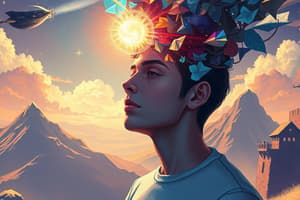Podcast
Questions and Answers
What are the three elements that compose self-concept according to Rogers?
What are the three elements that compose self-concept according to Rogers?
Which statement accurately describes self-esteem?
Which statement accurately describes self-esteem?
What effect can overly high self-esteem have on an individual?
What effect can overly high self-esteem have on an individual?
How might a large gap between self-image and ideal self affect a person?
How might a large gap between self-image and ideal self affect a person?
Signup and view all the answers
What does psychology study according to the definition provided?
What does psychology study according to the definition provided?
Signup and view all the answers
Which of the following correctly represents Freud's components of the self?
Which of the following correctly represents Freud's components of the self?
Signup and view all the answers
What are common outcomes of low self-esteem?
What are common outcomes of low self-esteem?
Signup and view all the answers
Which aspect of self-concept focuses on how one perceives their abilities and relationships?
Which aspect of self-concept focuses on how one perceives their abilities and relationships?
Signup and view all the answers
What primary concept did Erik Erikson introduce in his psychosocial development theory?
What primary concept did Erik Erikson introduce in his psychosocial development theory?
Signup and view all the answers
How many stages are included in Erik Erikson's psychosocial development theory?
How many stages are included in Erik Erikson's psychosocial development theory?
Signup and view all the answers
Which aspect does the 'Shadow' archetype in Jungian psychology represent?
Which aspect does the 'Shadow' archetype in Jungian psychology represent?
Signup and view all the answers
According to Carl Rogers, what is the 'Real Self'?
According to Carl Rogers, what is the 'Real Self'?
Signup and view all the answers
What consequence may arise if there is a significant discrepancy between the Real Self and Ideal Self?
What consequence may arise if there is a significant discrepancy between the Real Self and Ideal Self?
Signup and view all the answers
Which of the following is NOT a major Jungian archetype?
Which of the following is NOT a major Jungian archetype?
Signup and view all the answers
In Erikson's view, what elements interact at each life stage?
In Erikson's view, what elements interact at each life stage?
Signup and view all the answers
What is emphasized by Carl Jung regarding archetypes?
What is emphasized by Carl Jung regarding archetypes?
Signup and view all the answers
What is the primary function of the ego according to Freud's theory?
What is the primary function of the ego according to Freud's theory?
Signup and view all the answers
In Freud's psychosexual development theory, what is the focus during the oral stage?
In Freud's psychosexual development theory, what is the focus during the oral stage?
Signup and view all the answers
What is a potential outcome of fixation during the anal stage of development?
What is a potential outcome of fixation during the anal stage of development?
Signup and view all the answers
According to Jung, what do the anima and animus represent in an individual's personality?
According to Jung, what do the anima and animus represent in an individual's personality?
Signup and view all the answers
What does self-realization mean in Jung's perspective?
What does self-realization mean in Jung's perspective?
Signup and view all the answers
What critical developmental stage is emphasized by Freud as most impactful for social and personality development?
What critical developmental stage is emphasized by Freud as most impactful for social and personality development?
Signup and view all the answers
What is an example of a defense mechanism that people use when faced with anxiety?
What is an example of a defense mechanism that people use when faced with anxiety?
Signup and view all the answers
Which of the following statements best describes the role of society in relation to the id?
Which of the following statements best describes the role of society in relation to the id?
Signup and view all the answers
Study Notes
Self-Concept
- Rogers defines self-concept as the way we see and experience ourselves, consisting of three elements: self-image, self-esteem, and ideal self.
- Self-image is how we perceive our strengths and weaknesses, shaping our self-esteem.
- Self-esteem reflects positive and negative feelings about oneself, influenced by self-image.
- Excessive self-esteem can negatively impact behavior, potentially leading to bullying, social comparison, and prejudice.
- Low self-esteem is linked to psychological distress, such as anxiety, depression, and suicidal thoughts.
Ideal Self
- Our ideal self represents our aspirations and desires for who we want to become.
- A significant gap between actual self and ideal self can impact self-worth and lead to feelings of inadequacy.
Psychology of the Self
- Psychology explores the scientific study of behavior and mental processes.
- Aspects of the self, such as self-concept, self-esteem, self-awareness, and self-perception, contribute to our identity.
Sigmund Freud
- Freud, an Austrian neurologist, founded psychoanalysis, a school of thought that emphasizes the unconscious mind's influence on behavior.
- He proposed three structures of the mind: id, ego, and superego, interacting to shape the self.
- The id is driven by the pleasure principle, seeking immediate gratification, while ignoring social norms.
- The ego operates according to the reality principle, mediating between id impulses and superego demands, striving for rational and balanced behavior.
- The superego represents morality, acting as a conscience, enforcing social rules and guilt when they are disobeyed.
- Conflict between id and superego can lead to anxiety, prompting unconscious defense mechanisms to cope with this tension.
Psychosexual Development Theory
- Freud's theory proposes five stages of psychosexual development, where pleasure-seeking focuses on different erogenous zones.
- These stages are crucial for social and personality development, with potential fixations occurring if a stage is not successfully resolved.
- The oral, anal, and phallic stages are the first three stages, characterized by specific erogenous zones and developmental tasks.
The Anima and Animus
- Jung introduced the concepts of the anima and animus, representing the feminine and masculine aspects present in all individuals, regardless of gender.
The Self (Jungian Perspective)
- Jung believed that the self symbolizes the unified psyche, encompassing all aspects of the personality.
- Self-realization is the process of attaining selfhood, integrating all psychological components for greater harmony.
- Achieving selfhood involves achieving a balance between and among the archetypes.
Erik Erikson
- Erikson's psychosocial development theory emphasizes the progression of self-identity through eight stages, each presenting a distinct psychosocial dilemma or crisis.
- Each stage involves a conflict between a positive (syntonic) element and a disruptive (dystonic) element, influencing development.
Carl Jung (Jungian Archetypes)
- Jung's archetypes represent universal, inherited patterns of thought and behavior, influencing the personality.
- Major archetypes include:
- Persona: The social mask we present to the world.
- Shadow: The dark side of our personality.
- Anima: The feminine aspect of the male psyche.
- Animus: The masculine aspect of the female psyche.
- Self: The center of the personality, representing unity and wholeness.
Carl Rogers
- Rogers, a humanist psychologist, posits that the self is composed of two parts: the real self and the ideal self.
- The real self represents our true nature, while the ideal self reflects who we aspire to be and who we believe we should be.
- A significant discrepancy between the real self and the ideal self can lead to psychological distress like stress and anxiety, as striving for an unattainable ideal can be emotionally taxing.
Studying That Suits You
Use AI to generate personalized quizzes and flashcards to suit your learning preferences.
Related Documents
Description
Explore the essential elements of self-concept, including self-image, self-esteem, and the ideal self. Understand how these components influence our behavior, mental health, and self-worth. This quiz covers key concepts in psychology related to personal development and self-perception.




